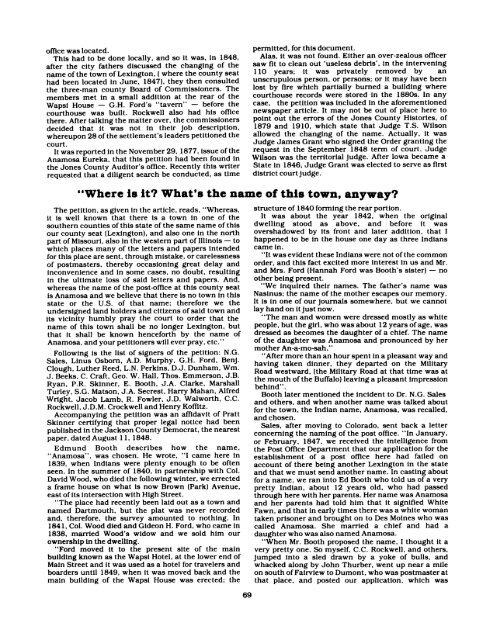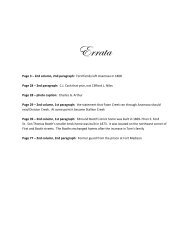Anamosa - A Reminiscence 1838 - 1988
The definitive history of the community of Anamosa, Iowa, USA
The definitive history of the community of Anamosa, Iowa, USA
You also want an ePaper? Increase the reach of your titles
YUMPU automatically turns print PDFs into web optimized ePapers that Google loves.
office was located.<br />
This had to be done locally, and so it was, in 1848,<br />
after the city fathers discussed the changing of the<br />
name of the town of Lexington. I where the county seat<br />
had been located in June, 1847), they then consulted<br />
the three-man county Board of Commissioners. The<br />
members met in a small addition at the rear of the<br />
Wapsi House — G.H. Ford's "tavern" — before the<br />
courthouse was built. Rockwell also had his office<br />
there. After talking the matter over, the commissioners<br />
decided that it was not in their job description,<br />
whereupon 28 of the settlement's leaders petitioned the<br />
court.<br />
It was reported in the November 29, I877, issue of the<br />
<strong>Anamosa</strong> Eureka, that this petition had been found in<br />
the Jones County Auditor's office. Recently this writer<br />
requested that a diligent search be conducted, as time<br />
permitted, for this document.<br />
Alas, it was not found. Either an over-zealous officer<br />
saw fit to clean out ‘useless debris‘, in the intervening<br />
110 years; it was privately removed by an<br />
unscrupulous person, or persons: or it may have been<br />
lost by fire which partially burned a building where<br />
courthouse records were stored in the 1880s. In any<br />
case. the petition was included in the aforementioned<br />
newspaper article. It may not be out of place here to<br />
point out the errors of the Jones County Histories. of<br />
1879 and I910. which state that Judge T.S. Wilson<br />
allowed the changing of the name. Actually, it was<br />
Judge James Grant who signed the Order granting the<br />
request in the September 1848 term of court. Judge<br />
Wilson was the territorial judge. After Iowa became a<br />
State in 1846, Judge Grant was elected to serve as first<br />
district courtjudge.<br />
“Where is it? What's the name of this town, anyway?<br />
The petition, as given in the article, reads, "Whereas,<br />
it is well known that there is a town in one of the<br />
southern counties of this state of the same name of this<br />
our county seat (Lexington), and also one in the north<br />
part of Missouri, also in the western part of Illinois — to<br />
which places many of the letters and papers intended<br />
for this place are sent, through mistake, or carelessness<br />
of postmasters, thereby occasioning great delay and<br />
inconvenience and in some cases. no doubt, resulting<br />
in the ultimate loss of said letters and papers. And,<br />
whereas the name of the post-office at this county seat<br />
is <strong>Anamosa</strong> and we believe that there is no town in this<br />
state or the U.S. of that name; therefore we the<br />
undersigned land holders and citizens of said town and<br />
its vicinity humbly pray the court to order that the<br />
name of this town shall be no longer Lexington, but<br />
that it shall be known henceforth by the name of<br />
<strong>Anamosa</strong>, and your petitioners will ever pray, etc."<br />
Following is the list of signers of the petition: N.G.<br />
Sales, Linus Osbom, A.D. Murphy, G.H. Ford, Benj.<br />
Clough. Luther Reed, L.N. Perkins, D.J. Dunham, Wm.<br />
J. Beeks, C. Craft, Geo. W. Hall, Thos. Emmerson, J.B.<br />
Ryan, P.R. Skinner, E. Booth, J.A. Clarke, Marshall<br />
Turley. S.G. Matson. J .A. Secrest, Harry Mahan, Alfred<br />
Wright. Jacob Lamb, R. Fowler. J.D. Walworth. C.C.<br />
Rockwell, J.D.M. Crockwell and Henry Koffitz.<br />
Accompanying the petition was an affidavit of Pratt<br />
Skinner certifying that proper legal notice had been<br />
published in the Jackson County Democrat, the nearest<br />
paper, dated August l 1, 1848.<br />
Edmund Booth describes how the name.<br />
"<strong>Anamosa</strong>", was chosen. He wrote, "l came here in<br />
1839, when Indians were plenty enough to be often<br />
seen. In the summer of 1840, in partnership with Col.<br />
David Wood, who died the following winter, we errected<br />
a frame house on what is now Brown (Park) Avenue.<br />
east of its intersection with High Street.<br />
“The place had recently been laid out as a town and<br />
named Dartmouth, but the plat was never recorded<br />
and, therefore, the survey amounted to nothing. In<br />
1841. Col. Wood died and Gideon H. Ford, who came in<br />
<strong>1838</strong>, married Wood's widow and we sold him our<br />
ownership in the dwelling.<br />
“Ford moved it to the present site of the main<br />
building known as the Wapsi Hotel, at the lower end of<br />
Main Street and it was used as a hotel for travelers and<br />
boarders until 1849, when it was moved back and the<br />
main building of the Wapsi House was erected: the<br />
structure of 1840 forming the rear portion.<br />
It was about the year 1842, when the original<br />
dwelling stood as above, and before it was<br />
overshadowed by its front and later addition. that I<br />
happened to be in the house one day as three Indians<br />
came in.<br />
"It was evident these Indians were not of the common<br />
order, and this fact excited more interest in us and Mr.<br />
and Mrs. Ford (Hannah Ford was Booth’s sister) — no<br />
other being present.<br />
"We inquired their names. The father's name was<br />
Nasinus: the name of the mother escapes our memory.<br />
It is in one of our joumals somewhere, but we cannot<br />
lay hand on it just now.<br />
"The man and women were dressed mostly as white<br />
people. but the girl. who was about 12 years of age, was<br />
dressed as becomes the daughter of a chief. The name<br />
of the daughter was <strong>Anamosa</strong> and pronounced by her<br />
mother An-a-mo-sah."<br />
"After more than an hour spent in a pleasant way and<br />
having taken dinner, they departed on the Military<br />
Road westward, (the Military Road at that time was at<br />
the mouth of the Buffalo) leaving a pleasant impression<br />
behind".<br />
Booth later mentioned the incident to Dr. N.G. Sales<br />
and others. and when another name was talked about<br />
for the town, the Indian name, <strong>Anamosa</strong>, was recalled,<br />
and chosen.<br />
Sales. after moving to Colorado, sent back a letter<br />
concerning the naming of the post office. "In January.<br />
or February. 1847. we received the intelligence from<br />
the Post Office Department that our application for the<br />
establishment of a post office here had failed on<br />
account of there being another Lexington in the state<br />
and that we must send another name. In casting about<br />
for a name. we ran into Ed Booth who told us of a very<br />
pretty Indian, about 12 years old, who had passed<br />
through here with her parents. Her name was <strong>Anamosa</strong><br />
and her parents had told him that it signified White<br />
Fawn, and that in early times there was a white woman<br />
taken prisoner and brought on to Des Moines who was<br />
called <strong>Anamosa</strong>. She married a chief and had a<br />
daughter who was also named <strong>Anamosa</strong>.<br />
"When Mr. Booth proposed the name, I thought it a<br />
very pretty one. So myself, C.C. Rockwell, and others,<br />
jumped into a sled drawn by a yoke of bulls. and<br />
whacked along by John Thurber, went up near a mile<br />
on south of Fairview to Dumont, who was postmaster at<br />
that place, and posted our application, which was



